9 Best ITSM Tools 2025: Features, Pros & How to Choose
Effective IT service management (ITSM) is critical for businesses striving to streamline their IT operations and align them with broader organizational goals. ITSM tools enable organizations to efficiently manage, deliver, and improve IT services, playing an integral role in reducing downtime, optimizing workflows, and enhancing productivity. With advancements in technology, the market is brimming with ITSM solutions that offer a myriad of features. But with so many options, finding the right tool for your business can feel overwhelming.
To make the selection process easier, we’ve compiled a list of the best ITSM tools for 2025. This guide not only highlights their key features but also outlines their strengths, limitations, and ideal use cases.
What Are ITSM Tools and Why Are They Important?
ITSM tools help manage the end-to-end delivery of IT services, from incident management and asset tracking to change management and service desk support. They empower IT teams to adopt structured processes, ensure accountability, and deliver services that align with the needs of the business.
Choosing the right ITSM tool can significantly impact service efficiency, employee satisfaction, and overall IT reliability. Now, let’s explore the leading ITSM tools for 2025.
Market Trends: As per MarketAndMarkets, the Global IT Service Management (ITSM) Market size was USD 10.5 billion in 2023 and is expected to reach USD 22.1 billion by 2028, at a CAGR of 15.9% during the forecast period.
Best IT Service Management Tools: Features, Pros & Cons
#1. ServiceNow
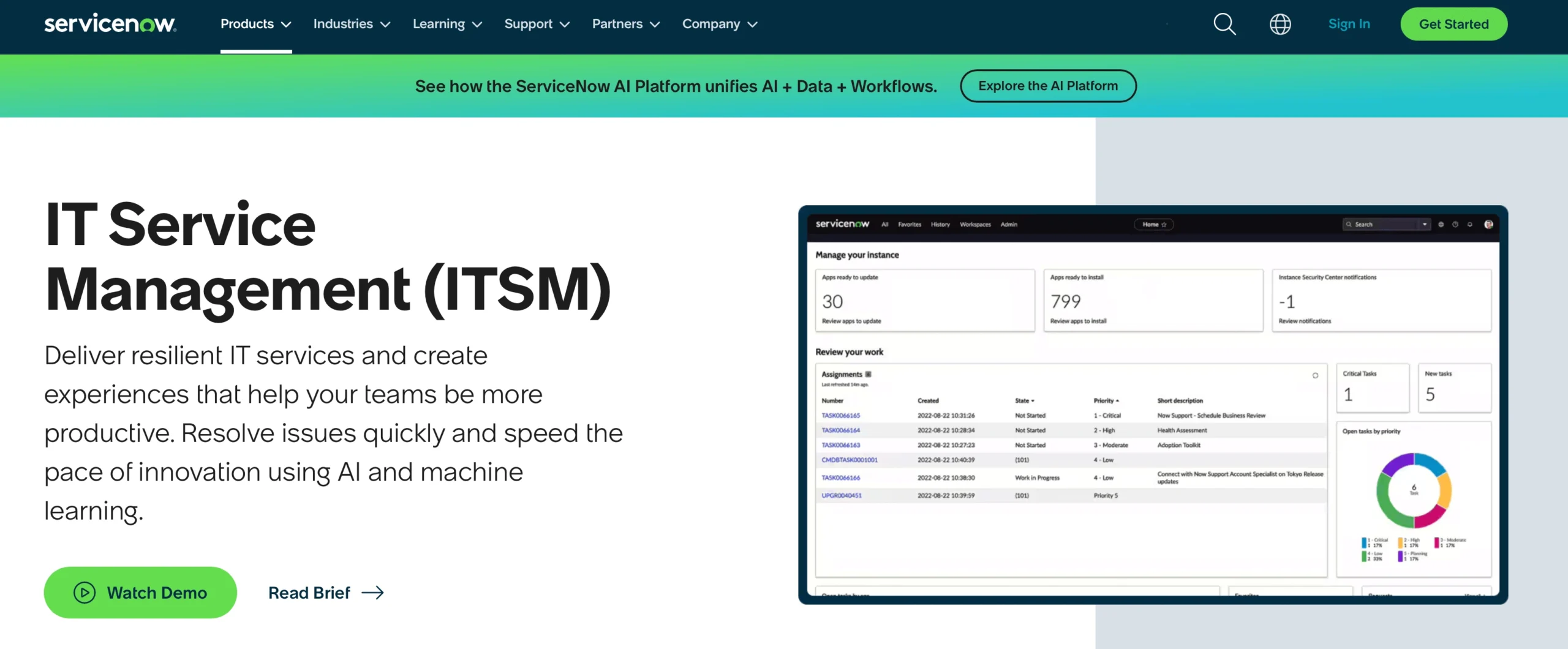
ServiceNow is a leading cloud-based ITSM platform that offers a wide range of solutions for IT service management, operations, and business process automation. Known for its scalability and robust capabilities, ServiceNow helps organizations streamline IT workflows, improve service delivery, and enable digital transformation through a unified platform.
Key Features
- Comprehensive ITSM platform offering incident, problem, change, and asset management.
- AI-powered predictive analytics and automated workflows.
- Intuitive self-service portal for end-users.
- Integration capabilities with a wide range of third-party applications.
- Mobile-friendly interface for on-the-go service management.
Pros
- Highly customizable to fit unique business needs.
- Extensive automation features reduce manual tasks.
- Scalable for businesses of any size.
- Offers a rich ecosystem of add-ons and expansions through the ServiceNow Store.
Cons
- Steep learning curve for new users.
- Higher price point compared to other solutions.
#2. BMC Helix ITSM
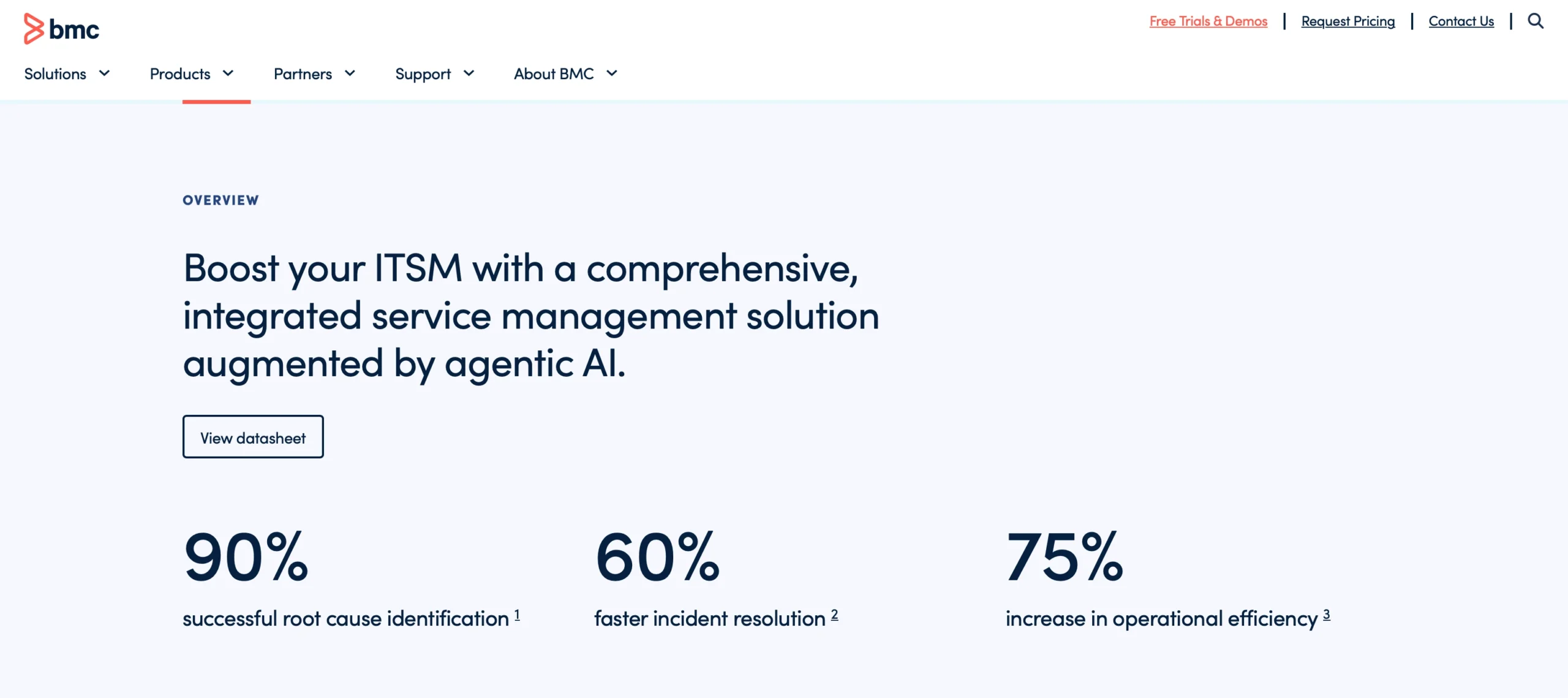
BMC Helix ITSM is suited for businesses operating in complex, multi-cloud IT environments that require robust automation and scalability.
BMC Helix ITSM is a comprehensive, cloud-based IT service management solution that leverages artificial intelligence and automation to streamline IT service delivery. Built with flexibility in mind, it offers organizations the ability to manage complex hybrid and multi-cloud environments while remaining compliant with ITIL best practices.
Key Features
- AI-driven service desk functionalities.
- Native multi-cloud capabilities.
- Built-in ITIL (Information Technology Infrastructure Library) framework compliance.
- Centralized knowledge management.
- Smart automation for incident and change management.
Pros
- Strong focus on AI and machine learning for proactive issue resolution.
- Cloud-based with robust security measures.
- Supports hybrid IT environments effectively.
Cons
- Setup and customization can be time-intensive.
- Costs can add up, especially for smaller businesses.
#3. Freshservice
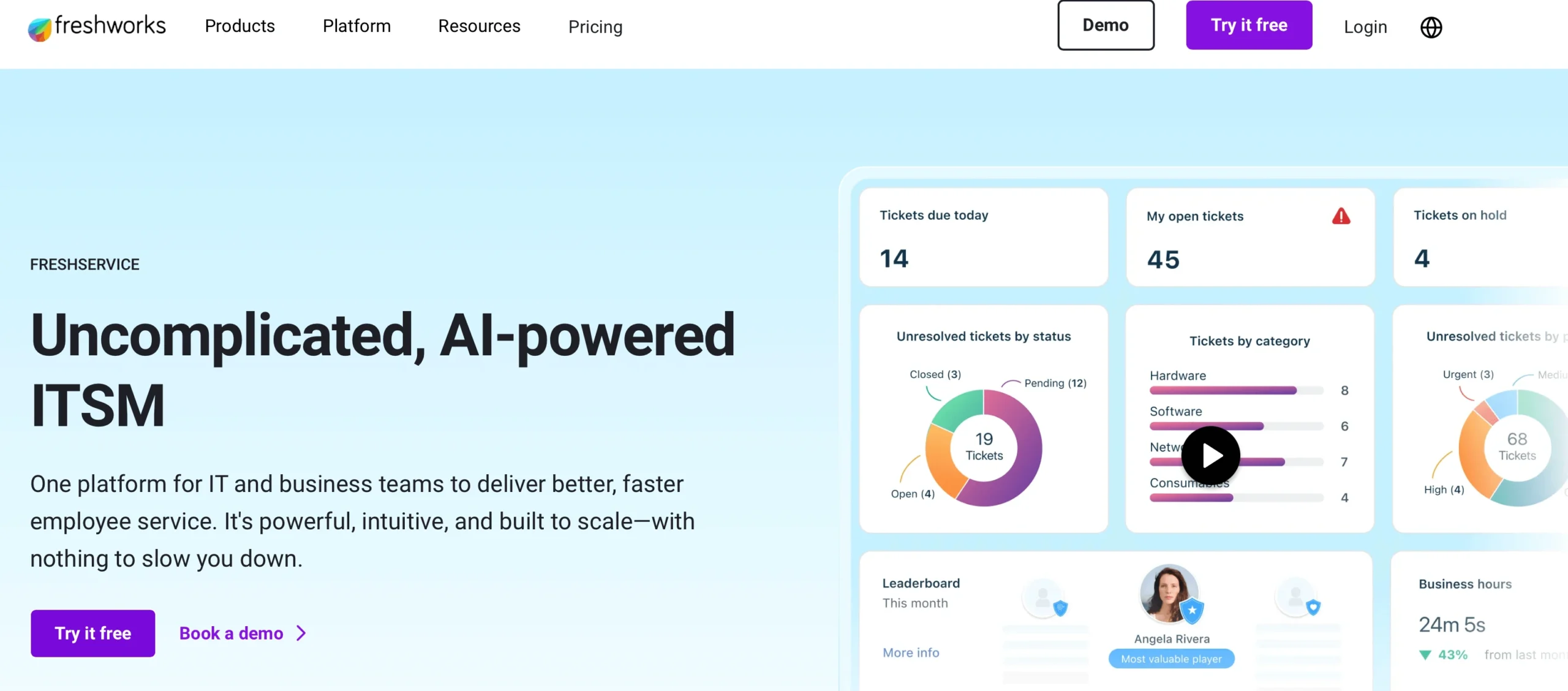
Freshservice is perfect for small to mid-sized businesses looking for an easy-to-deploy, budget-friendly ITSM tool with essential features.
Freshservice by Freshworks is a cloud-based IT service management solution designed to simplify and automate IT operations for businesses of all sizes. Its user-friendly interface and robust automation features make it easy to streamline service requests, manage assets, and ensure seamless collaboration between IT teams.
Key Features
- Simple and intuitive interface for rapid adoption.
- AI-powered automation for ticketing and workflow management.
- Asset management, CMDB (Configuration Management Database), and reporting tools.
- Pre-built integrations with popular SaaS tools.
Pros
- Affordable and accessible for small to mid-sized businesses.
- Easy to implement with minimal IT expertise required.
- Strong focus on customer and employee experience.
Cons
- May lack the advanced customization and scalability larger enterprises need.
- AI features are not as sophisticated as some competitors.
#4. ManageEngine ServiceDesk Plus
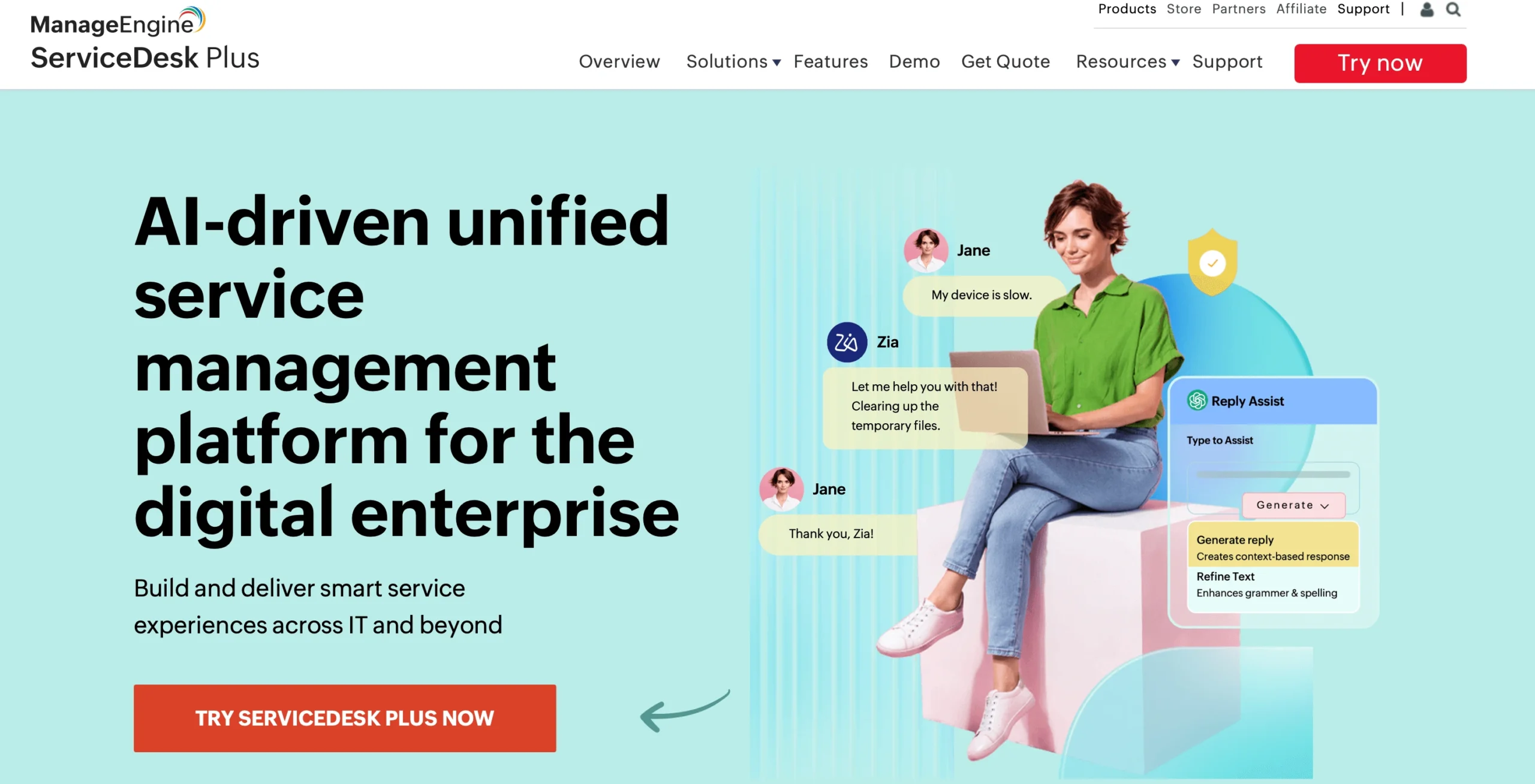
ManageEngine ServiceDesk Plus is a great choice for mid-sized organizations looking for a reliable on-premise or cloud ITSM tool within a reasonable budget.
ManageEngine ServiceDesk Plus is an integrated IT service management software that caters to organizations seeking a robust, user-friendly solution for handling IT support, asset management, and ticketing needs. It streamlines service desk operations through automation and offers scalable deployment options to suit various business sizes.
Key Features
- Comprehensive service desk solution with IT asset management.
- Configurable workflows for incident, problem, and change management.
- Seamless integration options with monitoring tools like OpManager.
- On-premise and cloud deployment options.
Pros
- Offers excellent value for its price.
- Easy to use with minimal training requirements.
- Strong reporting and analytics capabilities.
Cons
- Scalability can be a concern for very large organizations.
- User interface can feel outdated compared to modern ITSM tools.
#5. Zendesk for Service Management
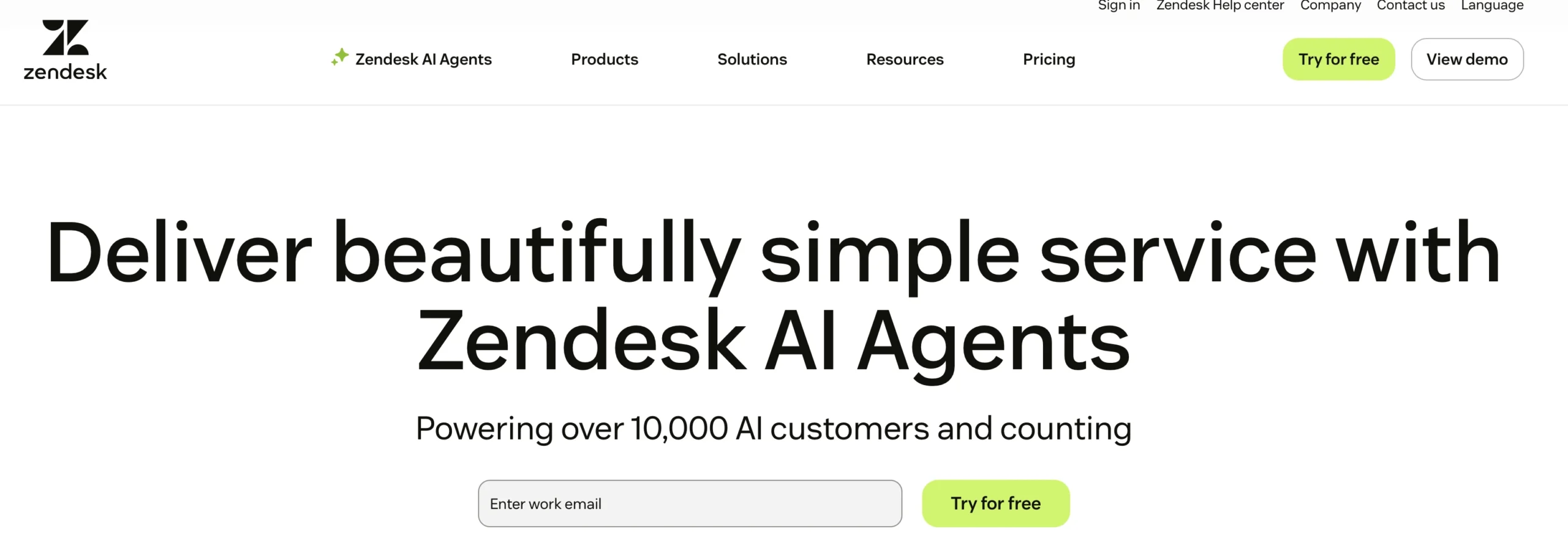
Zendesk excels in scenarios where businesses want to integrate ITSM with customer service workflows. It’s particularly popular with small to medium-sized companies.
Zendesk for Service Management is a flexible, cloud-based ITSM platform designed to help organizations deliver seamless support across multiple channels. Known for its intuitive interface and strong focus on user experience, Zendesk enables IT teams to efficiently manage tickets, automate workflows, and facilitate self-service for end users. With robust integration options and powerful analytics, it’s a popular choice for companies aiming to unify IT and customer service operations.
Key Features
- Versatile service desk solution with multichannel support.
- Knowledge management tools for self-service capabilities.
- Built-in dashboards and reporting for data-driven insights.
- Collaboration tools for IT and non-IT teams.
Pros
- Simple and flexible licensing structure.
- Integration options with customer experience and CRM software.
- Exceptional user-friendly interface.
Cons
- Limited depth in IT-specific management features.
- May not be suitable for handling complex IT environments.
#6. SolarWinds Service Desk
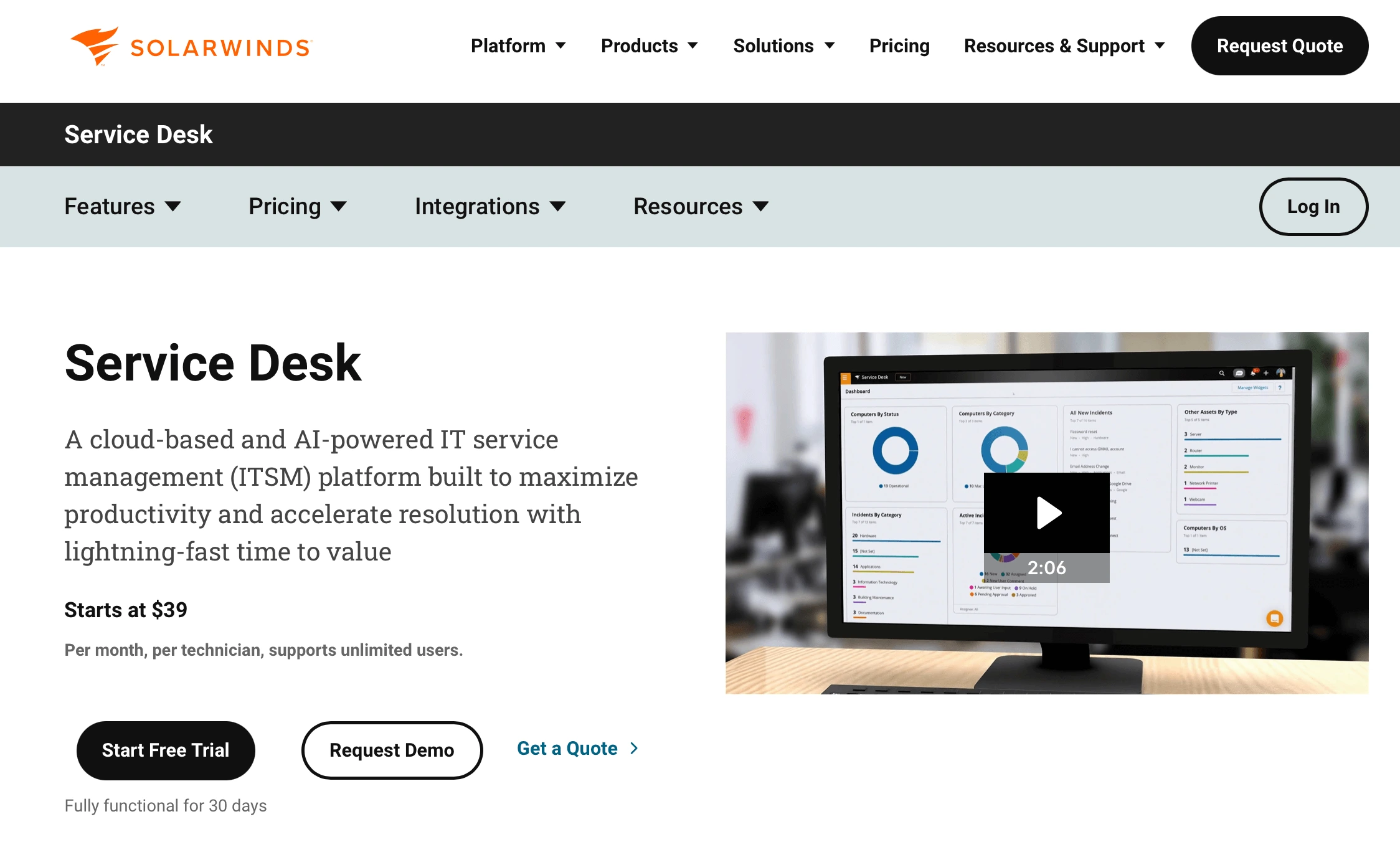
SolarWinds Service Desk is ideal for organizations seeking an accessible, scalable, and automation-friendly ITSM platform with robust asset management and reporting features.
SolarWinds Service Desk is a comprehensive, cloud-based ITSM solution designed to help organizations effectively manage IT services, automate workflows, and track assets. It streamlines IT operations through powerful automation and provides robust reporting, making it a flexible choice for businesses aiming to improve efficiency and visibility within their IT environment.
Key Features
- Cloud-based ITSM platform with automated ticketing and workflow management
- Integrated asset and configuration management
- Advanced reporting and analytics dashboards
- Self-service portal and knowledge base for end-users
- Native integrations with popular business and monitoring tools
Pros
- User-friendly interface with easy setup and configuration
- Powerful automation for repetitive tasks and approvals
- Strong asset tracking capabilities
- Scalable to support mid-sized and large organizations
Cons
- Advanced features may require additional learning
- Integration with some legacy tools may require customization
#7. NinjaOne

NinjaOne is best suited for MSPs, small to mid-sized businesses, and organizations with a distributed IT environment looking for a combined ITSM and endpoint management tool.
NinjaOne is a cloud-based IT management solution designed to simplify IT operations for managed service providers (MSPs) and internal IT teams. It offers a unified platform that brings together ITSM, endpoint management, and remote monitoring into a single, easy-to-use interface.
Key Features
- Unified platform for ITSM, endpoint management, and remote monitoring
- Automated patch management and remote device control
- Customizable ticketing system and workflows
- Real-time alerts and actionable insights
- Seamless integration with common productivity and security tools
Pros
- Streamlined management of IT assets and endpoints from a single dashboard
- Efficient remote IT support and proactive monitoring
- Fast deployment and intuitive user experience
- Excellent for distributed and hybrid workforces
Cons
- Limited advanced ITSM-specific features compared to larger platforms
- May not meet needs of complex enterprise environments
#8. SuperOps.ai
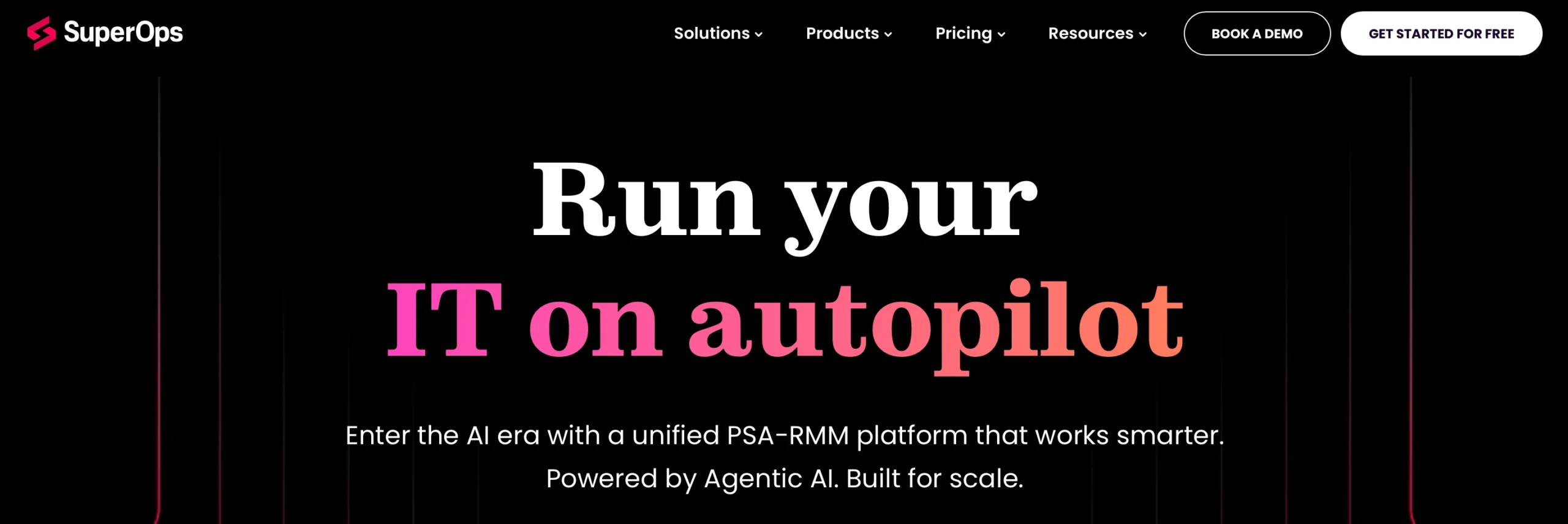
SuperOps.ai is ideal for MSPs and IT service providers seeking a unified, cloud-based tool that bridges ITSM, PSA, and RMM functions with AI-powered automation.
SuperOps.ai is a next-generation, cloud-native ITSM platform designed specifically for managed service providers (MSPs) and IT teams. It integrates IT service management with professional services automation (PSA) and remote monitoring and management (RMM), providing a comprehensive solution for ticketing, project tracking, asset management, and workflow automation—all powered by intuitive design and AI-driven insights.
Key Features
- Modern, cloud-native ITSM platform with PSA (Professional Services Automation) integration
- Automated ticketing, project management, and documentation tools
- Built-in RMM (Remote Monitoring and Management)
- AI-driven workflows and smart recommendations
- White-labeling options for MSPs
Pros
- Highly intuitive and modern user interface
- Combines ITSM and PSA features in one solution
- Quick to set up and easy to customize
- Excellent for managed service providers
Cons
- Some features are newer and still maturing
- Integration options may be limited compared to established rivals
#9. CA Service Desk Manager (CA SDM)
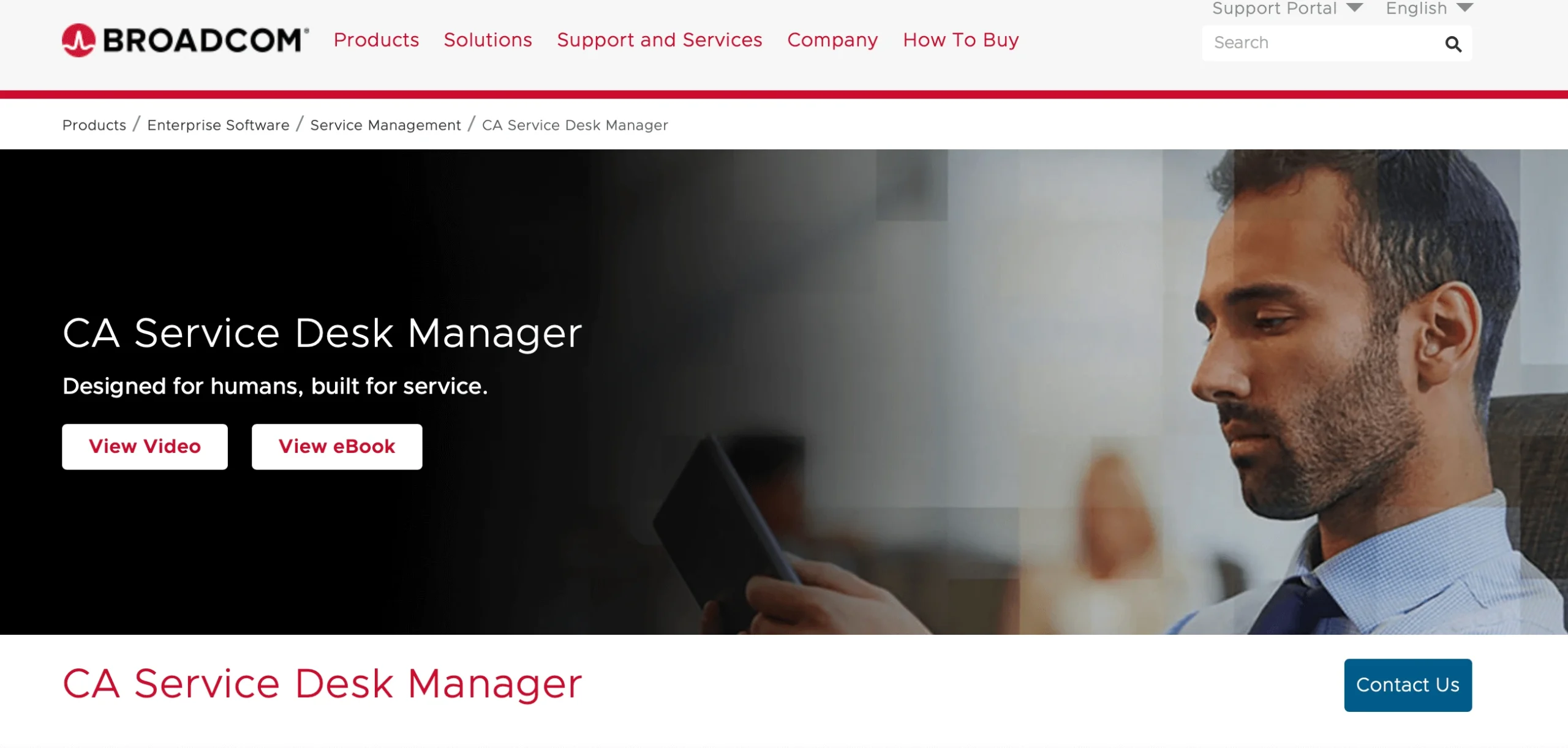
CA Service Desk Manager is best for large enterprises or organizations with advanced ITIL requirements and the need for tailored processes and high scalability.
CA Service Desk Manager (CA SDM) is an enterprise-level ITSM platform designed to support complex service environments with end-to-end management of IT processes. Trusted by large organizations worldwide, it provides robust ITIL-aligned service management capabilities, advanced automation options, and the scalability required for global operations and multi-tenant architectures.
Key Features
- Enterprise-grade ITSM solution supporting the full ITIL suite
- Advanced incident, problem, change, and release management
- Flexible workflow and automation engine
- Multi-tenancy support for large organizations
- Detailed reporting and process tracking
Pros
- Highly customizable for complex enterprise requirements
- Scalable and secure for global deployments
- Comprehensive ITIL and process automation support
Cons
- Complex implementation may require significant resources
- User interface is less modern than newer competitors
How to Choose the Right ITSM Tool
Selecting the right ITSM tool requires careful evaluation of your business’s unique needs. Here are a few tips to guide your decision-making process:
- Assess Your Requirements: Map out your ITSM goals. Do you need incident management, automation, asset tracking, or all of the above? Understanding your priorities will help narrow down the list.
- Define Your Budget: ITSM tool pricing can vary significantly. Be realistic about your budget and consider both initial implementation costs and ongoing expenses.
- Consider Scalability: Choose a solution that can grow alongside your business. Avoid tools that will become obsolete as your IT landscape evolves.
- Evaluate Integration and Customization: Seamless integration with your existing tools and processes is crucial. Opt for platforms that allow easy customization to fit your organization’s needs.
- Trial and Feedback: Take advantage of trial periods to test software capabilities. Gather input from your IT team to ensure the tool meets their expectations.
Final Thoughts
ITSM tools are indispensable for businesses looking to elevate their IT service delivery and management. The tools listed above—ServiceNow, BMC Helix ITSM, Freshservice, ManageEngine ServiceDesk Plus, Zendesk, SolarWinds Service Desk, NinjaOne, SuperOps.ai, and CA Service Desk Manager—represent the best of what 2025 has to offer. Each solution brings a unique combination of features to the table, catering to diverse organizational needs.
By carefully assessing your organization’s requirements, budget, and scalability needs, you can find the perfect ITSM tool to support your IT goals and drive business success. Whether you’re a small startup or a large enterprise, the right ITSM tool can transform how you manage IT services, foster efficiency, and deliver exceptional value.
